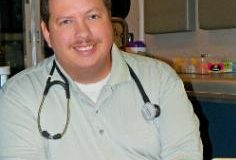“Thank you so much for coming, young man,” the old woman tells me, for the fourth time this call. “I don’t know what I would have done without you.” Her voice is frail, querulous. She seems grateful and apologetic at the same time.
“It’s no problem, Ma’am,” I assure her with a warm smile. “This is what we do.”
“It’s just that he’s so heavy,” she explains, yet again. “I can barely move him, and when his legs give out, he just…” her voice trails off helplessly.
“He’s a big man,” I agree. “You need some help with him, that’s for sure.”
I don’t make the usual suggestions. He has a home health nurse, but she can’t be here 24 hours a day, and they can’t afford a sitter. There were two children, and they’ve outlived them both. I know this, because this isn’t my first call at this address.
Nor is it even my tenth.
We come here once or twice a week, to this small frame house on the north end of town, an impossibly neat and tidy oasis of better times in this wasteland of crack houses and urban blight. They built here, sixty years ago, back when this was a nice place to live. Back then, they left their doors unlocked, and knew every one of their neighbors.
Now, there are bars on the windows and doors, and they live in fear of their neighbors. But they are still together after sixty-plus years, and they will not be separated, nor will they live elsewhere. This is their home. Nothing will separate them.
Not even a stroke.
And so now her days are spent caring for her husband and this house, his strength but a shadow of what it once was. The house shows the lack of a man’s touch for the past eighteen months. The interior is still immaculate, the flower beds carefully tended, but the yard is thick with unmowed grass and the cheery yellow paint is peeling.
She needs help. She’s much too frail to manage Frank alone. She’d struggle with a man his size even if she were still the dark-haired girl of twenty in the wedding photo in their foyer. Her husband needs to be in a nursing home.
But that would mean being apart. When you’re eighty, the only thing you fear more than the loss of your independence is being separated from the spouse you’ve slept beside for the past sixty years.
And so here she remains, at his side, and every few days she will be unable to lift him from his chair, and Frank will slide gently to the floor, there to remain until the EMTs pick him up. He’s never injured when we do these calls — he never has anything resembling an emergent complaint.
“Okay, Mr. Hildwine,” I smile reassuringly as my partner and I grasp his hands, “let’s get you off the floor and back into bed, shall we?”
His left hand rises to meet mine, the grip still strong, but the right remains uselessly at his side. His eyes are still sharp and clear, and in them, gratitude wars with frustration at his helplessness. My partner and I gently lift, and pull Frank Hildwine to a standing position. We stand there for a moment, waiting for him to regain his equilibrium, hovering just a touch away should his right leg betray him yet again. We hold his arms as he haltingly makes the five steps to his hospital bed, and we tuck him under the covers when we’re done.
“Here, take this,” his wife says gratefully, thrusting a crumpled twenty into my palm, just as she has done every other time we’ve come here.
I shake my head gently and place the bill back into her palm, clasping my hand over her clenched fist. “That’s not necessary, Mrs. Hildwine,” I say. “There’s no charge.”
“Violet,” she corrects automatically. “I’ve told you to call me Violet. And you can’t keep coming out here and not expect to be paid!”
“Yes we can,” I say with a wink, “and if I call you ‘Violet’ instead of ‘Mrs Hildwine’, my Grandma would rise out of the ground and git me.”
“But, but…” she splutters. “You young men are here several times a week, and I know you have sick people to take care of. This is not what I should be calling 911 for, but I just don’t know what else to do. Please, let me offer you something.”
I consider that for a moment. She’s right, this is not what we were trained for. There is no emergent medical complaint, never enough trauma to warrant any treatment. Frank and Violet Hildwine do not need the services of a paramedic.
Then again, I believe there is honor in the implicit compact; someone calls 911, an ambulance comes. Always. Who am I to say what form my help should take when I arrive?
“Very well, Mrs. Hildwine,” I sigh. “The going rate for helping your husband off the floor is a couple of those oatmeal cookies I saw on your kitchen counter. One for me, and one for my partner.”
As she ushers us outside, cookies in hand, she apologizes again for calling. “I’m so sorry I had to trouble you again for this. I know you have more important things to do.”
“No Ma’am,” I tell her firmly as I take another bite of cookie. “You need us, you call. Anytime, any where, we’ll be there.”
To celebrate EMS Week, EMS1 is holding a contest. The theme of EMS Week 2010 is “Anytime. Anywhere. We’ll be there.”
Be it a short story of 500 words or less like the one above, a poem, a photo or a video with a 50 word caption, we want to hear of the time you were there. Click here and enter now! Deadline is May 16.
I won’t be entering the contest, but I’ll be on the judging panel, so I’m calling out all my EMS peeps and fellow bloggers. Epijunky, Lt. Michael Morse, Ckemtp, Happy Medic, Medic 999, Medic Scribe and all the rest of you… send us your stories!
 Ambulance Driver Files A Day in the Life | Kelly Grayson
Ambulance Driver Files A Day in the Life | Kelly Grayson


